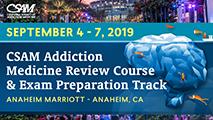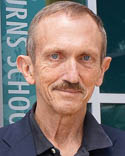
Spirituality and Mutual Help (2019) | William Haning, MD
This presentation is part of the Addiction Medicine Review Course 2019, an overview of the core elements of addiction medicine, presented by top experts in the field. Together with the other presentation it can serve as a broad review for clinicians, a review of the basics for newcomers, or a starting point for those preparing to sit for the Board of Addiction Exam.
Learners cannot sign up for individual lectures only for the full Addiction Medicine Review Course 2019.
Target Audience
- Addiction medicine specialists who want an overview of the latest developments in the field and their relevance to clinical practice
- Primary care clinicians who want to get a better understanding of addiction and manage patients with addictions in their practice
- Public health officials who want an understanding of the current state of addiction treatment
- Non-physicians who are involved in the treatment of addiction
Learning Objectives
- Identify the tenets of 3 or more of the dominant mutual-help programs (MK)
- Characterize one’s own relationship to the patient and to the programs, in advocating, assisting, or re-directing participation [Treatment Matching] [ (CS)
- Set a personal boundary for engagement, as either a physician in recovery or as a participant in the recovery process (SBP)

William Haning, MD
Bill Haning is Emeritus Professor of Psychiatry at the John A. Burns School of Medicine, University of Hawai’i, where he served as Director of M.D. Programs until retirement (2017); he directs the Addiction Psychiatry/Addiction Medicine Residency Training Programs and is PI for the Pacific Addiction Research Center (PARC®). Editor-in-Chief of the ASAM Weekly, he chairs the Examination Committee, Addiction Psychiatry, American Board of Psychiatry and Neurology (ABPN).
Nothing to disclose.
CSAM
The California Society of Addiction Medicine (CSAM) is accredited by the Institute for Medical Quality/California Medical Association to provide continuing medical education for physicians. CSAM takes responsibility for the content, quality and scientific integrity of this CME activity.
CSAM designates this live educational activity for a maximum of 1 AMA PRA Category 1 Credits™, Physicians should only claim credit commensurate with the extent of their participation in the activity.
Continuing education credit is available for psychologists, therapists, substance use counselors, nurses and physician assistants.
(see additional information on page for parent course)
Available Credit
- 0.75 AMA Category 1
- 0.75 Attendance

 Facebook
Facebook X
X LinkedIn
LinkedIn Forward
Forward